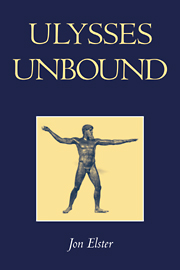I - Ulysses Revisited: How and Why People Bind Themselves
Published online by Cambridge University Press: 07 December 2009
Summary
INTRODUCTION: CONSTRAINT THEORY
In this chapter I discuss why individuals may want to restrict their freedom of choice and how they achieve this end. Broadly speaking, they may want to protect themselves against passion, preference change, and (two varieties of) time-inconsistency. They do so by removing certain options from the feasible set, by making them more costly or available only with a delay, and by insulating themselves from knowledge about their existence.
In this section, I want to locate constraints that individuals impose on themselves within the broader field of what one might call “constraint theory.” At a very general level, the present book illustrates the proposition that sometimes less is more or, more specifically, that sometimes there are benefits from having fewer opportunities rather than more. This idea must be seen on the background of the standard case, in which the exact opposite is true. Prima facie it would seem that nobody could have a motivation for discarding options, delaying rewards, or imposing cost on themselves. And in most of everyday life this intuition is obviously correct. Most people would rather have more money than less, more occupational options rather than fewer, rewards sooner rather than later, a larger range of potential marriage partners rather than a smaller one, and so on.
Information
- Type
- Chapter
- Information
- Ulysses UnboundStudies in Rationality, Precommitment, and Constraints, pp. 1 - 87Publisher: Cambridge University PressPrint publication year: 2000
